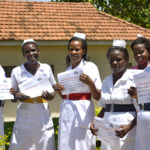Global UN fund awards $250,000 grant for the development and adoption of global menstrual product standards. Supporting Low- and Middle-Income Countries (LMICs) in their participation in the SIS-led process will contribute to the removal of one of the biggest barriers to access quality, affordable menstrual products for hundreds of millions of women and girls.
GENEVA/STOCKHOLM October 2, 2024 – The UN’s Sanitation and Hygiene Fund (SHF) is announcing a grant of $250,000 to the Swedish Institute for Standards (SIS) to support the participation of Low- and Middle-Income Countries (LMICs) in the development of global quality standards for menstrual products. As the secretariat of the technical committee of the International Organization for Standardization (ISO) Menstrual Products – SIS will use the funding to provide National Standards Bodies (NSBs) from LMICs with training, partnering with more experienced NSBs and supporting up to 10 countries to fully participate in all aspects of the standardization work and encourage subsequent national adoption.
Today, more than 600 million women and girls in Low- and Middle-Income Countries (LMICs) – a staggering one in three – rely on toilet paper, rags and other non-purpose-made materials to manage their menstruation, impacting their health, education, socio-economic participation and ultimately their future. While single-use pads or tampons are prohibitively expensive for many, more affordable menstrual product innovations face an important barrier to be imported and sold in LMICs: the lack of global product standards which are fundamental to manufacturing, retail and trade. The ISO Technical Committee led by SIS, is presently working to develop global menstrual product standards in four categories: single- and multi-use products worn externally or internally, covering everything from pads and tampons to period-underwear and menstrual cups, by mid-2027. The resulting standards will become the global framework but national adoption depends on each country. Currently, a little over 15% of LMICs are represented in the technical committee, while their needs are the greatest.
“It is hard to believe that the process to develop global quality standards for products used by almost 2 billion people every month has only just started recently and it is up to us now to ensure that this process is truly global,” said Sue Coates, Deputy Executive Director SHF and Lead for Capital M, SHF’s market-led moonshot for menstrual health.
“Global quality standards will have direct impacts on the menstrual product choices available to the millions of women and girls in LMICs currently relying on non-purpose-made materials. By ensuring an inclusive, global process, we can level the playing field, for countries to participate in the process and adopt the standards nationally, for markets and businesses to grow and scale, and most importantly, for women and girls and the choices they make,” Coates added.








